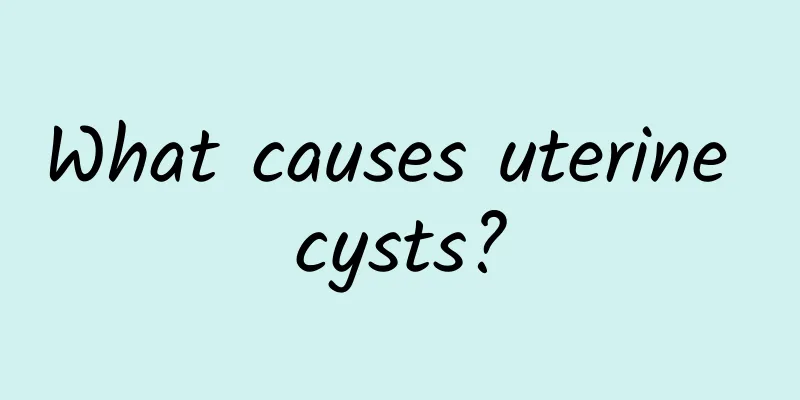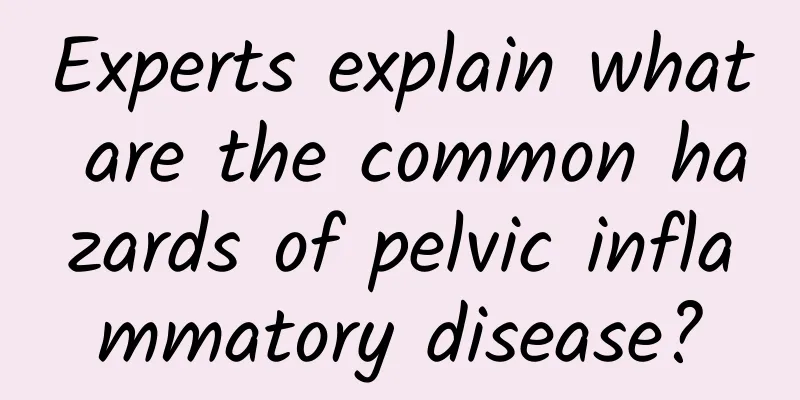What causes uterine cysts?

|
Uterine cysts are mostly caused by physiological changes, local injuries or chronic inflammation. Usually no treatment is required, but surgery may be considered if bleeding is frequent. 1. Physiological changes When the squamous epithelium of the cervix replaces the columnar epithelium, the new squamous epithelium may cover or penetrate into the glandular duct opening, causing the secretions to be unable to be discharged smoothly, forming a cyst. This situation is similar to a blocked water pipe, which naturally accumulates into a pool. In most cases, this physiological change is natural and will not cause serious impact on health. 2. Local damage Rough sex may cause damage to the cervix. If the injury is repeated during the healing process, the glandular opening will gradually narrow and eventually form a cyst. Imagine that a wound that is repeatedly scratched will become tighter when it heals, and the narrowing of the glandular opening is similar. To avoid this, it is recommended to be gentle during sex and avoid excessive force. 3. Chronic cervicitis Chronic inflammation can block the glandular duct opening and lead to cyst formation. Just like a long-term chronic cough may cause throat discomfort, chronic inflammation can also have a similar effect on the cervix. Regular gynecological examinations and timely treatment of cervical inflammation can help prevent the formation of cysts. 4. Symptoms and diagnosis Superficial cysts are usually seen as small bluish-white cysts on the surface of the cervix, while deep cysts may have no obvious external symptoms but may cause the cervix to enlarge. Regular gynecological examinations are key to detecting these problems, especially when unexplained bleeding or discomfort occurs. 5. Treatment and prevention Most uterine cysts do not require treatment, but if bleeding or other discomfort occurs after contact, surgery can be considered. In terms of prevention, it is very important to maintain good living habits and regular physical examinations. A healthy diet, moderate exercise and good personal hygiene habits can help reduce the risk. 6. Mental health concerns Although uterine cysts sound worrying, they are not serious in most cases. Maintaining a good mental state, facing it positively, and understanding relevant knowledge can effectively reduce unnecessary anxiety. Understanding the causes and prevention of uterine cysts, getting regular checkups, and maintaining a healthy lifestyle are all important steps to protect your health. I hope this information will help you better understand and manage your health. |
<<: Drugs to inhibit uterine fibroids
>>: Can women detect endometriosis early?
Recommend
What are the symptoms of pelvic inflammatory effusion?
What are the symptoms of pelvic inflammatory effu...
Is it normal for the color of the menstrual period to be bright red? If it is stable, it is normal
If the menstrual blood is bright red, it is norma...
Eat out for extra protection and choose high-quality local ingredients from CAS
With the change of social patterns, the proportio...
Symptoms of Bartholinitis
People can judge whether they have vestibular gla...
How much does it cost to have a painless abortion?
The cost of painless abortion varies depending on...
What should I do if my period is delayed for two consecutive months?
What should I do if my period is delayed for two ...
Is it expensive to treat menopause?
Menopause is not as terrible as many women think,...
Love text? Golden Glory? Jade text? I love eating mangoes but I’m afraid of getting fat. Which one has lower calories?
The mango season is here, and different varieties...
What should middle-aged women do if their menstrual volume decreases significantly?
What should middle-aged women do if their menstru...
What should we do before medical abortion?
Nowadays, more and more female friends choose med...
How can women regulate the symptoms of irregular menstruation?
Among women's gynecological diseases, irregul...
What is cervical warts?
What is cervical condyloma acuminatum? We know th...
How should female friends better prevent adnexitis?
Adnexitis refers to inflammation of the fallopian...
What are the possible causes of ectopic pregnancy?
When every mother is pregnant, her heart is full ...
How does the hospital treat premature ovarian failure?
For premature ovarian failure, try to go to local...









